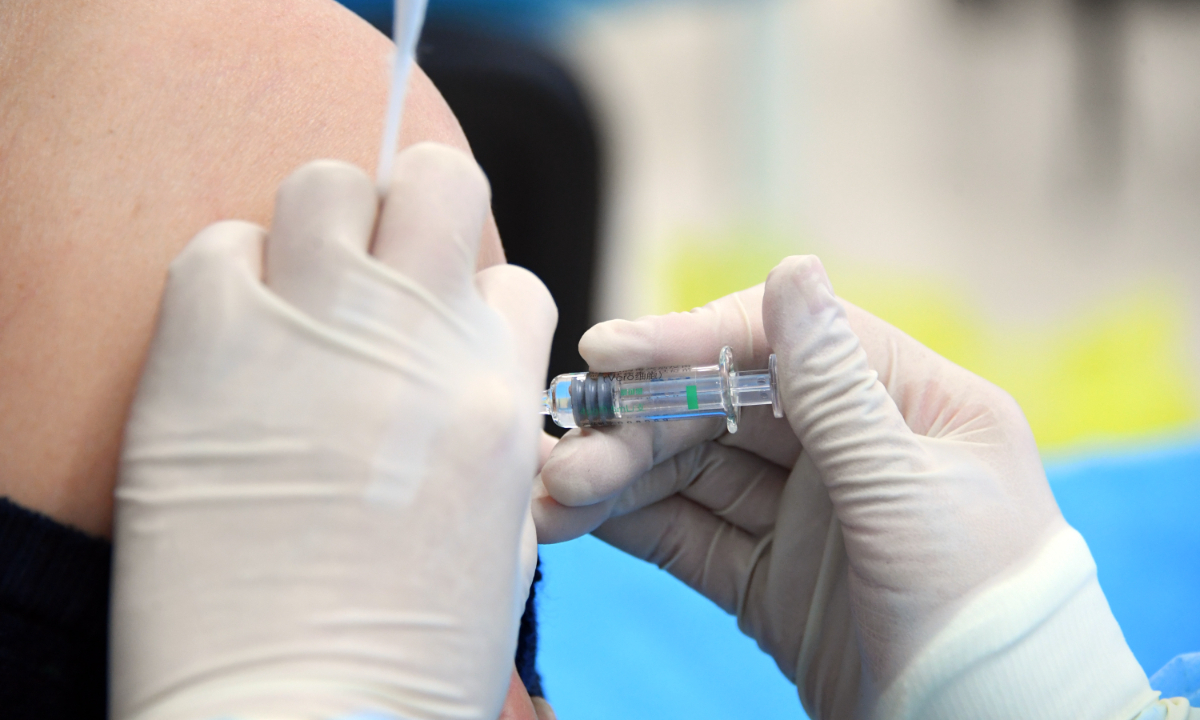
A medical worker inoculates a recipient with a COVID-19 vaccine at a temporary inoculation site in Haidian district in Beijing, capital of China, January 11, 2021. Photo: Xinhua
A Chinese political advisor has called for further optimization of the approval process for emergency use of vaccines and other drugs to cope with public health emergencies, while also suggesting encouragement for vaccine R&D to strengthen Chinese vaccines' global brand image.
A motion suggested by Zhu Tao, a member of the 14th National Committee of the Chinese People's Political Consultative Conference (CPPCC), recommended improving the enforcement of laws related to drugs and vaccines, such as the introduction of a clear compensation scheme for damage caused by emergency use of drugs, and the introduction of a third-party insurance mechanism to minimize public risk and vaccination hesitation.
Zhu said he expects to see more active policy guidance in favor of vaccine innovation such as attracting high-level talent and providing tax and tariff reduction policies.
The motion echoes the Government Work Report delivered during the first session of the 14th National People's Congress (NPC) on Sunday, which called for epidemic prevention and medical treatment for key groups, as well as upgrading of vaccines and the development of new drugs.
At present, China needs to be more scientific, precise and efficient in its epidemic prevention and control, with a focus on treatment for the elderly, children and groups suffering from basic diseases. It should advance the iterative upgrading of vaccines and R&D of new drugs, to effectively protect people's life and health, Premier Li Keqiang said in his report.
"Since the beginning of the 21st century, several global public health emergencies have emerged and required urgent treatment - from the SARS outbreak in 2002, and influenza A (H1N1) in 2009, to the Ebola outbreak in Africa in 2014 - all of which tested governments' ability to respond to increasingly complex and volatile public health crises," Zhu told the Global Times.
However, at present, the relevant laws and regulations of China are abstract and vague in terms of launch conditions, authorization principles, evaluation procedures and other details for emergency use authorization, according to Zhu.
He suggested that the drug administration should issue corresponding review principles to further guide research organizations and drug authorities.
To better cope with major public health emergencies, Zhu said the government should establish a national reserve for key materials used for innovative drugs and vaccines, in order to prevent shortages.
As of February 23, 90.58 percent of the total population has been fully vaccinated, according to official data.
"So far, more than 200 million people in China have received medical treatment against COVID-19, nearly 800,000 severe cases have been effectively treated, and the death rate from COVID-19 has remained at the lowest level in the world. This is a miracle in the history of human civilization in combating major epidemics, and it has provided necessary resilience for overall economic recovery. It shows that timely vaccination is the most efficient and cost-effective way to prevent infectious diseases," said Zhu, who is also the chief scientist at vaccine producer CanSinoBIO.
Over the past three years, Chinese vaccine developers have seen rapid development, and their R&D level has gone from being backward to a leading position. The quality of Chinese vaccines has also been widely recognized around the world, he said.
So far, three domestic COVID-19 vaccines have been included in the WHO emergency use list. The world's first inhaled vaccine developed by CanSinoBIO has also been recognized at home and abroad.
In the post-pandemic era, China's independent vaccine research and development needs to be further strengthened to consolidate China's international influence in this field, Zhu concluded.




